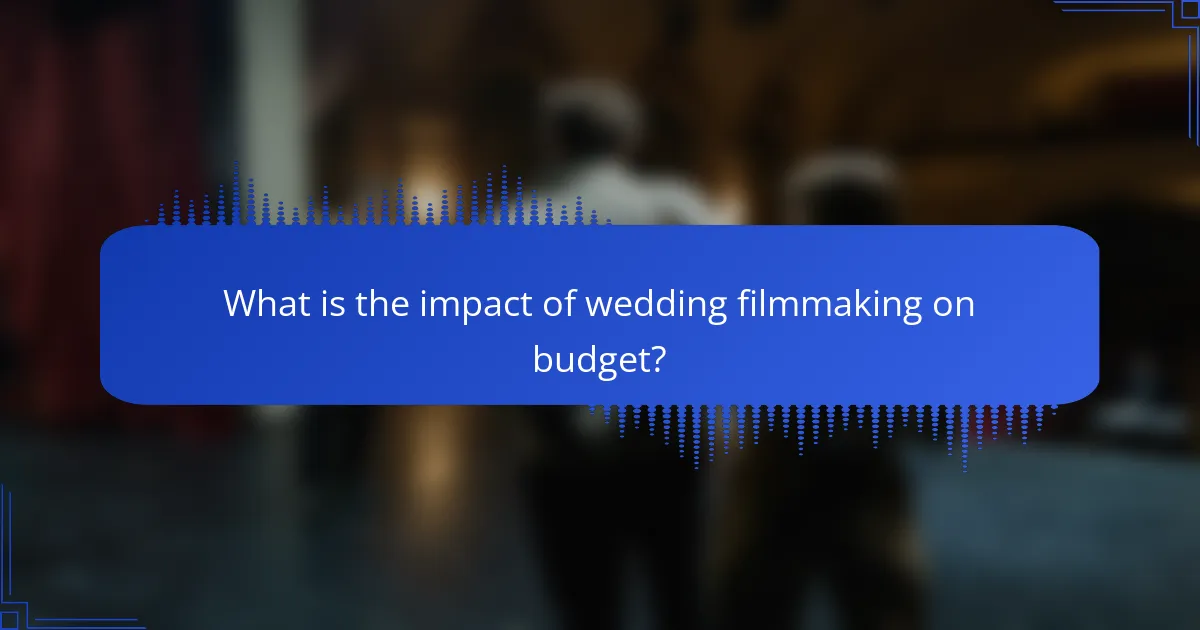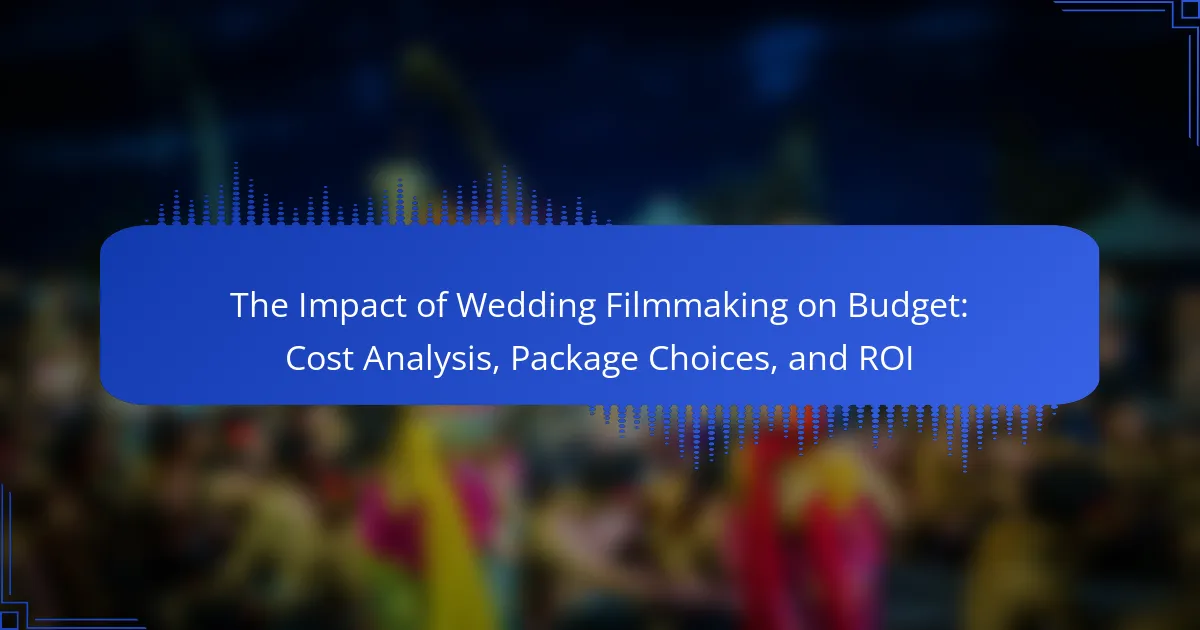Wedding filmmaking is a significant budget consideration for couples, with professional videography services ranging from $1,000 to over $10,000. The costs are influenced by factors such as the videographer’s experience, package options, and coverage duration. Couples often opt for comprehensive packages that include editing and multiple cameras, which can further increase expenses. Investing in wedding filmmaking provides both emotional benefits, such as preserving cherished memories, and tangible benefits, like sharing the film with loved ones. Research indicates that 80% of couples who invest in wedding films report higher satisfaction with their wedding experience, highlighting the potential return on investment (ROI) of this service. To maximize their budget, couples are advised to prioritize essential services, research filmmakers, and remain flexible with their plans.

What is the impact of wedding filmmaking on budget?
Wedding filmmaking significantly impacts the budget by adding substantial costs. Professional videography services can range from $1,000 to over $10,000. The price varies based on factors like experience, package options, and duration of coverage. Couples often choose packages that include editing, multiple cameras, and additional features, which increase costs. Additionally, high-quality equipment and skilled personnel contribute to higher expenses. Investing in wedding filmmaking can yield a strong return on investment through lasting memories. Studies show that couples prioritize videography for preserving their wedding day, making it a key budget consideration.
How does wedding filmmaking influence overall wedding costs?
Wedding filmmaking increases overall wedding costs primarily through service fees and package pricing. Filmmakers typically charge for their time, equipment, and expertise. The average cost of wedding videography ranges from $1,000 to $5,000, depending on the package. Higher-end packages may include multiple cameras, drone footage, and extended editing services. Additional costs can arise from travel fees if the venue is distant. Couples often prioritize videography for its emotional value, which can justify the expense. Investing in quality filmmaking can enhance the wedding experience and preserve memories.
What are the typical expenses associated with wedding filmmaking?
Typical expenses associated with wedding filmmaking include equipment costs, personnel fees, and post-production expenses. Equipment costs can range from $2,000 to $10,000 for cameras, lenses, and audio gear. Personnel fees often involve hiring a videographer, which can vary from $1,500 to $5,000 depending on experience and package. Post-production expenses include video editing, which may cost between $500 and $2,000. Travel expenses may also apply, particularly if the wedding is in a distant location, ranging from $100 to $1,000. Additionally, there may be costs for licensing music, which can be around $100 to $500. Overall, couples should budget anywhere from $3,000 to $15,000 for comprehensive wedding filmmaking services.
How do wedding filmmaking costs compare to other wedding services?
Wedding filmmaking costs typically range from $1,500 to $10,000. This range is comparable to other wedding services like photography, which averages between $1,200 and $3,500. Videography often costs more than services such as floral arrangements and catering. Floral services can average around $2,000, while catering costs can vary from $3,000 to $10,000 depending on the guest count. According to The Knot’s 2022 Real Weddings Study, couples spend about 10-15% of their total budget on videography. This percentage aligns closely with spending on photography, which also falls within that range. Thus, wedding filmmaking costs are significant but consistent with other essential wedding services.
What factors affect the cost of wedding filmmaking?
The cost of wedding filmmaking is influenced by several key factors. The experience level of the filmmaker significantly affects pricing. More seasoned professionals typically charge higher rates due to their expertise. The duration of coverage also impacts costs. Longer filming times require more resources and editing work. Equipment quality plays a crucial role as well. High-end cameras and audio gear increase production expenses.
Additionally, the complexity of the wedding day can raise costs. Unique venues or elaborate setups may require more planning and logistics. Custom packages tailored to specific client needs can also affect pricing. These packages may include additional services like drone footage or multi-camera setups. Lastly, geographical location influences costs. Filmmakers in urban areas often charge more than those in rural regions.
How do the length and complexity of the wedding affect filmmaking costs?
The length and complexity of a wedding significantly impact filmmaking costs. Longer weddings require more filming hours, which increases labor costs. Complex weddings often involve multiple locations, diverse setups, and various events, necessitating additional equipment and personnel. Each added element, such as live performances or intricate decor, demands more time for planning and execution. For instance, a wedding with multiple ceremonies or cultural traditions may need specialized videographers, further raising costs. Research indicates that average wedding videography costs can rise by 20-30% for more intricate events. Thus, both length and complexity directly correlate with higher filmmaking expenses.
What role do location and travel expenses play in wedding filmmaking budgets?
Location and travel expenses significantly impact wedding filmmaking budgets. These costs can vary widely based on the wedding venue’s distance from the filmmaker’s base. Filmmakers often charge for travel time, fuel, and accommodations. For example, a destination wedding may incur higher expenses due to flights and hotel stays. Additionally, remote locations may require extra equipment transport, increasing costs. According to a survey by WeddingWire, 25% of couples reported travel expenses as a key factor in their overall wedding budget. Therefore, couples should factor in these expenses when planning for wedding filmmaking services.
What are the different package choices available for wedding filmmaking?
Wedding filmmaking offers various package choices. These packages typically include options such as basic, standard, and premium services. A basic package may cover essential filming during the ceremony and a short highlight reel. The standard package often includes full coverage of the ceremony and reception, along with a longer edited video. Premium packages generally provide additional features like drone footage, multiple camera angles, and extended editing. Some filmmakers also offer customizable packages to suit specific client needs. Each package varies in price and features, allowing couples to choose based on their budget and preferences.
What are the common types of wedding filmmaking packages?
Common types of wedding filmmaking packages include highlight reels, full-length films, and documentary-style coverage. Highlight reels typically last 3 to 5 minutes and showcase the best moments of the day. Full-length films provide a comprehensive view, often lasting 30 to 60 minutes. Documentary-style coverage captures the day in a narrative format, focusing on storytelling. Additional options may include drone footage, same-day edits, and additional camera operators. Each package varies in price, with highlight reels generally being the most affordable. Full-length films and documentary-style options tend to be more expensive due to the extended coverage and editing required.
How can couples customize their wedding filmmaking packages?
Couples can customize their wedding filmmaking packages by selecting specific services and features that suit their needs. They can choose the duration of coverage, such as full-day or partial-day filming. Couples may also specify the style of video, including documentary, cinematic, or highlight reel formats. Additionally, they can request add-ons like drone footage or same-day edits.
Many filmmakers offer options for different numbers of cameras and videographers. Couples can also select their preferred music or voiceover options for the final edit. Customization may extend to the delivery format, such as digital downloads or physical DVDs. By tailoring these aspects, couples ensure their packages align with their vision and budget.

How can couples assess the return on investment (ROI) of wedding filmmaking?
Couples can assess the return on investment (ROI) of wedding filmmaking by evaluating the emotional and tangible benefits of the final product. Emotional benefits include preserving memories and capturing significant moments that can be cherished for years. Tangible benefits may involve the potential for sharing the film with family and friends, enhancing the overall wedding experience.
To quantify the ROI, couples can compare the cost of wedding filmmaking to the value of the memories created. For example, if a wedding film costs $3,000 and provides lasting joy and connection for the couple and their families, they can assess its worth based on the emotional impact. Additionally, couples can consider the longevity of the film compared to other wedding expenses, such as flowers or catering, which may not provide lasting value.
Research indicates that 80% of couples who invest in wedding films report higher satisfaction with their wedding experience. This statistic supports the notion that the emotional ROI can outweigh the initial monetary investment. Thus, by analyzing both emotional and tangible returns, couples can effectively assess the ROI of wedding filmmaking.
What metrics can be used to evaluate the ROI of wedding filmmaking?
Metrics to evaluate the ROI of wedding filmmaking include customer satisfaction, repeat business, and referrals. Customer satisfaction can be measured through post-event surveys. High satisfaction rates often lead to positive word-of-mouth. Repeat business occurs when couples recommend services to friends and family. Referrals can be quantified by tracking new clients gained through recommendations. Financial metrics also play a role. Comparing the total revenue generated from bookings to the costs of production is essential. Analyzing profit margins helps assess financial success. Additionally, social media engagement metrics can indicate brand visibility and interest. Tracking views, shares, and comments on wedding films can provide insight into audience reach.
How do emotional and sentimental values factor into ROI assessments?
Emotional and sentimental values significantly influence ROI assessments in wedding filmmaking. These values enhance perceived worth beyond financial metrics. Emotional connections foster client loyalty, leading to referrals and repeat business. Sentimental content often results in higher engagement on social media platforms. Studies indicate that emotionally resonant marketing can increase customer spending by up to 23%. This demonstrates the tangible financial benefits of addressing emotional factors in ROI calculations. Thus, incorporating emotional and sentimental values can lead to a more comprehensive understanding of ROI in wedding filmmaking.
What are the long-term benefits of investing in wedding filmmaking?
Investing in wedding filmmaking provides long-term benefits such as preserving memories and enhancing emotional connections. Wedding films capture moments that photographs cannot convey, allowing couples to relive their special day. These films can be shared with family and friends, fostering connections across generations.
Moreover, high-quality wedding films can appreciate in sentimental value over time. They serve as a legacy for future children and grandchildren, showcasing family history. According to a survey by The Knot, couples who invest in videography report higher satisfaction with their wedding experience.
Additionally, wedding filmmaking can enhance a couple’s brand if they are in the wedding industry. A well-produced film can attract future clients and increase referrals. Overall, the long-term benefits of wedding filmmaking include emotional preservation, generational legacy, and potential professional advantages.
What are the potential hidden costs associated with wedding filmmaking?
Potential hidden costs associated with wedding filmmaking include travel expenses, overtime fees, and additional editing costs. Travel expenses can arise if the filming location is far from the videographer’s base. Overtime fees may be charged if the event extends beyond the contracted hours. Additional editing costs can occur if the couple requests extra features or revisions after the initial edit. Equipment rental fees may also apply if specialized gear is needed for the wedding. Insurance costs for equipment and liability can add to the overall budget. These costs can significantly impact the total expenditure if not accounted for in advance.
How can couples avoid unexpected expenses in wedding filmmaking?
Couples can avoid unexpected expenses in wedding filmmaking by establishing a clear budget upfront. They should research and compare different filmmaking packages. Understanding what each package includes helps prevent hidden costs. Couples must communicate their expectations with the filmmaker. This ensures alignment on services and deliverables. Reading contracts thoroughly is essential to identify any additional fees. Setting a contingency fund for unforeseen expenses can also be beneficial. According to a survey by The Knot, 45% of couples exceed their budget due to unplanned costs. This highlights the importance of careful planning and communication.
What additional costs should couples consider when planning their budget?
Couples should consider several additional costs when planning their wedding budget. These costs can significantly impact overall expenses. First, there are venue fees, which may include deposits and rental charges. Catering costs also add up, covering food, beverages, and service staff. Couples should not overlook decoration expenses, including flowers and table settings. Photography and videography services typically incur additional charges, particularly for extended hours or special requests. Entertainment costs, such as live bands or DJs, are essential to factor in. Transportation expenses for guests and the wedding party can also increase the budget. Lastly, attire costs, including wedding dresses and suits, often exceed initial estimates. These additional costs can collectively amount to a substantial portion of the wedding budget.

What tips can help couples maximize their wedding filmmaking budget?
Couples can maximize their wedding filmmaking budget by prioritizing essential services and planning ahead. First, they should define their budget clearly and stick to it. Researching various filmmakers and comparing packages can reveal cost-effective options. Booking services during off-peak seasons often results in discounts. Couples should consider shorter films, as they typically cost less to produce. Communicating specific needs and expectations with the filmmaker can help avoid unnecessary expenses. Additionally, couples can seek recommendations from friends or family to find reliable options. Finally, maintaining flexibility with dates and locations can lead to better deals.
How can couples effectively communicate their budget to filmmakers?
Couples can effectively communicate their budget to filmmakers by being clear and upfront about their financial limits. They should prepare a detailed budget outline that includes all relevant categories such as videography, editing, and additional services. Sharing this budget during initial consultations helps filmmakers tailor their packages to fit the couple’s needs. Couples should also discuss their priorities, such as the length of coverage and specific moments they want captured. Providing examples of previous work that aligns with their budget can aid in this communication. Clear dialogue about expectations and limitations fosters a collaborative relationship. Establishing a comfortable environment for discussion encourages transparency and understanding. This approach ensures that filmmakers can deliver the best possible service within the couple’s financial framework.
What strategies can help couples prioritize their wedding filmmaking needs?
Couples can prioritize their wedding filmmaking needs by establishing a clear budget. This budget should include specific allocations for different aspects of filmmaking, such as videography services, equipment, and editing. Research indicates that couples who set a budget are 30% more likely to stay within their overall wedding expenses.
Next, couples should identify their key priorities for the wedding film. This could include aspects like capturing specific moments, style preferences, or the length of the final product. By defining these priorities, couples can communicate effectively with filmmakers.
Additionally, couples should research and compare different filmmaking packages. Understanding what each package includes can help in making informed decisions. A study found that couples who compare at least three options tend to find better value.
Finally, couples should schedule consultations with potential filmmakers. These discussions can clarify expectations and help couples gauge the filmmaker’s style and compatibility. Engaging in this dialogue can lead to more tailored services that align with the couple’s vision.
How can couples ensure they receive the best value for their investment in wedding filmmaking?
Couples can ensure they receive the best value for their investment in wedding filmmaking by researching and selecting experienced filmmakers. Experienced filmmakers often have a portfolio that showcases their style and quality. Couples should also clearly communicate their vision and expectations to the filmmaker. This ensures alignment on the final product.
Additionally, comparing packages from multiple filmmakers can help identify the best fit for their budget. Couples should inquire about what each package includes, such as duration of coverage and number of edits. Reading reviews and testimonials from previous clients provides insight into the filmmaker’s reliability and quality.
Finally, establishing a budget beforehand helps couples make informed decisions. According to The Knot’s 2022 Real Weddings Study, couples spend an average of $2,000 to $3,000 on wedding videography. This information helps set realistic expectations and ensures they prioritize their investment effectively.
The main entity of this article is wedding filmmaking, which encompasses the costs, package choices, and return on investment (ROI) associated with videography services for weddings. The article provides a detailed analysis of how wedding filmmaking impacts overall budgets, outlining typical expenses, factors affecting costs, and comparisons with other wedding services. It explores various package options, customization possibilities, and strategies for couples to maximize their investment in wedding filmmaking, while also highlighting the emotional and sentimental value that contributes to ROI assessments. Additionally, the article addresses potential hidden costs and offers tips for effective communication with filmmakers to ensure alignment with budgetary constraints.



